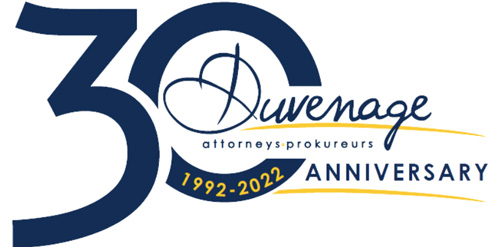On Thursday, 5 March 2020, Health Minister Dr Zweli Mkhize confirmed South Africa’s first positive case of the coronavirus disease (Covid-19).
Covid-19 is a highly-transmittable virus that spreads through respiratory droplets produced when an infected person coughs or sneezes and between people in close contact. Countries already infected have discouraged or prohibited collective gatherings at venues such as movie theatres, schools, universities and even places of worship.
While South Africa’s Department of Health has advised the public on certain precautionary measures that may be taken, it has not issued specific directives for employers managing the health and safety of their employees, customers, business partners and suppliers who may often be required to work in close proximity.
As Covid-19 continues to spread, it is imperative that South African employers and their employees work together to safeguard their health and safety.
Legal obligations of employers
Section 8 of the Occupational Health and Safety Act, 1993 (OHSA) requires every employer to provide and maintain, as far as reasonably practicable, a working environment that is safe and without risks to the health of its employees.
This duty includes (i) taking steps to eliminate or mitigate any hazard or potential hazard, before resorting to personal protective equipment; (ii) providing information, instructions, training and supervision that may be necessary to ensure the health and safety of employees at work; and (iii) enforcing such measures as may be necessary in the interests of health and safety. Section 9 extends these duties towards persons other than those in employment affected by the employer’s activities.
The General Safety Regulations published under the OHSA prohibit an employer from permitting a person to enter a workplace where the health and safety of such person is at risk.
Employers may accordingly impose rules on their employees in order to ensure a safe working environment and, in addition, it may place conditions on entry into its premises. Employers may exclude persons from their premises if they do not abide by those rules. It is on this basis that entry to building sites may be subject to the wearing of hard hats and other protective clothing.
In light of Covid-19, a legitimate entry requirement may be requiring the disclosure of recent international travel and subjecting individuals to a temperature test, if necessary. Any such test must be conducted with due regard to the individual’s privacy and the individual’s informed consent should first be obtained. The temperature test itself should be as un-invasive as possible, and screeners as opposed to thermometers placed in the ear or mouth, are advisable.
If an individual refuses to be subjected to a temperature test, the employer may rely on other available information, such as persistent coughing or sneezing, and must then take appropriate measures.
The Environmental Regulations issued in terms of the OHSA provide, inter alia, that the employer must ensure that its workplace premises are ventilated in such a way that the air breathed by the employees does not endanger their safety.
Where there is a danger of unsafe air (in the case of Covid-19 infected respiratory droplets), the employer must provide the employees (and must ensure that they correctly use) respiratory protective equipment of a type that reduces exposure.
Businesses are therefore required to ensure that the air-conditioning systems at their premises do not expose the employees to the risk of infection.
Further, the Facilities Regulations require employers to provide (free of charge) sanitary facilities, soap or a similar cleansing agent as well as hot and cold water. The employer is also required to maintain rooms and facilities that are clean and hygienic. Door handles, surfaces, and computer keyboards should be given particular attention and be wiped/ cleaned regularly.
Currently, employers do not have any reporting obligations to the Government in respect of a suspected case of Covid-19 infection.
Legal obligations of employees
The OHSA also imposes a duty on employees to take reasonable care for their own health and safety and that of other persons who may be affected in the workplace. Employees who act in violation of an employer’s health and safety rules or who disobey reasonable and lawful instructions in this regard may be subjected to appropriate disciplinary action. Blatant disregard for such rules or instructions could potentially be grounds for dismissal on the basis of misconduct.
If an employee becomes aware of a situation that is unsafe or unhealthy, s/he must report such a situation to the employer as soon as practicable. In the context of Covid-19, this may include a suspicion that a fellow-employee or customer/ client exhibits flu-like symptoms or is running a fever. The employer should then take appropriate steps, such as requesting the individual concerned to submit to a temperature test, and to require the person concerned to leave the premises if need be. Again, such testing may only be conducted with the individual’s informed consent.
Pedantic or negligent
The OHSA provides general obligations, and the specific steps that an employer may be required to take in order to ensure health and safety would depend on the particular circumstances of the workplace concerned.
It is important to remember that 'reasonably practicable' measures must be taken. A proper assessment of what would be reasonably practicable must be made. If taken too far, such measures could be challenged on the basis of being unreasonable or inappropriate; but, if not taken when necessary to safeguard the health and safety of the workplace, an employer may be found to be negligent and liable for the consequences.
The Compensation for Occupational Injuries and Diseases Act, 1993 (COIDA) protects the employer from delictual liability in respect of employees who contract an illness during the course and scope of her/ his employment. An employee who contracts an occupational disease can claim from the Compensation Fund without having to prove the employer’s negligence.
However, if the employer was in fact negligent, the employee may receive increased compensation and the cost of such increased compensation may be passed on to the employer in the form of increased assessment rates.
COIDA also only protects employers against claims arising out of injuries or diseases contracted by their employees in the course and scope of employment. Customers or clients who contract a disease due to their interaction with the workplace would have to institute a civil claim, and the normal delictual principles will apply.
Employers will need to strike the correct balance in implementing measures that are appropriate for managing the health and safety of the workplace. Covid-19 has officially reached South Africa and employers and employees should be prepared by fully understanding their obligations to protect themselves and others from exposure and prevent further infection.
This article was written by Talita Laubscher, Chloё Loubser and Amy Thompson. It is the first in a series of newsflashes on this topic. Please be sure not to miss the next one.
If you have any queries, please contact our Employment and Benefits Practice





